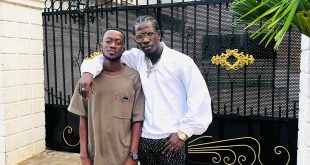On Wednesday, July 31, 2024, Jamaican dancehall artist Vybz Kartel was freed from prison after judges in an Appeals Court decision said he should not face a retrial for murder.
For many, the musician spent 13 years of his life in prison but the question is, “What led to his incarceration?”
Why Was Vybz Kartel Imprisoned For 13 Years? The Real Story
The 48-year-old, real name Adidja Palmer was jailed in 2014 after he was convicted of murdering his friend Clive “Lizard” Williams in Jamaica.
His trial in 2014 heard that victim Clive Williams and another man, Lamar Chow, were given two unlicensed firearms belonging to Kartel for safekeeping.
When they failed to return them at an agreed time, prosecutors said they were summoned to Kartel’s house in August 2011.
Chow told the trial they were attacked and the last thing he saw was Clive Williams – who was never seen alive again – lying motionless on the ground.
The house burned down days later and his body was never found.
Williams was killed on August 16th in Havendale, about 20 miles northeast of Kartel’s native Portmore neighbourhood.
JAIL AND APPEAL
Kartel and his co-accused Shawn Campbell, Kahira Jones and Andre St John, always maintained their innocence but were convicted and jailed for life, with Kartel told he would spend a minimum of 35 years in prison.
He appealed first to courts in Jamaica before taking his case to the Privy Council in London, which serves as the highest court of appeal in Jamaica and other Commonwealth countries.
His defence team argued that a juror accused of trying to bribe others should have been thrown off his trial.
The London court agreed with Kartel’s case and ruled in March that the decision not to remove the juror made the conviction unsafe.
The judges said it was “fatal to the safety of the convictions which followed” and “an infringement of the [defendants’] fundamental right to a fair hearing”.
On Wednesday, Justice Marva McDonald-Bishop, one of three judges sitting at Jamaica’s Court of Appeal, said they had weighed up the “egregious nature and seriousness of the offence” against the passage of time, lack of access to witnesses and evidence and the huge expense of a retrial.
She also said Kartel was in “declining health” and a new trial would have an impact on his physical and mental wellbeing.
“We conclude that the interests of justice do not require a new trial,” she said, adding that Kartel and his co-defendants were formally acquitted.
According to the AFP news agency, there was heavy security at the courthouse in Jamaica’s capital, Kingston, and the hearing was closely watched across the country.
 Hordlive Get the best info about Social Flirting, Social Shyness, Social Friends, Social Relationships and Social Networking.
Hordlive Get the best info about Social Flirting, Social Shyness, Social Friends, Social Relationships and Social Networking.



